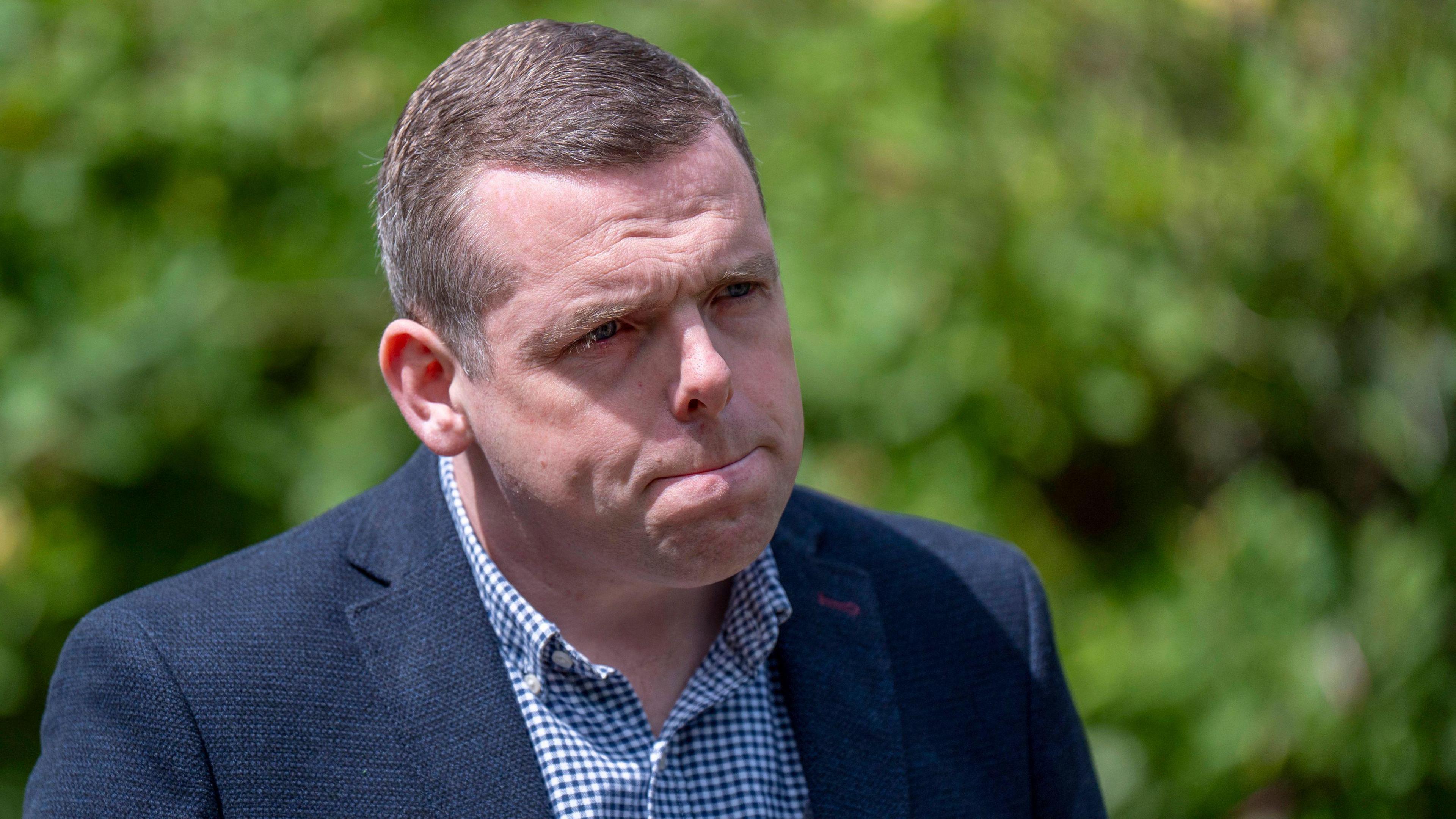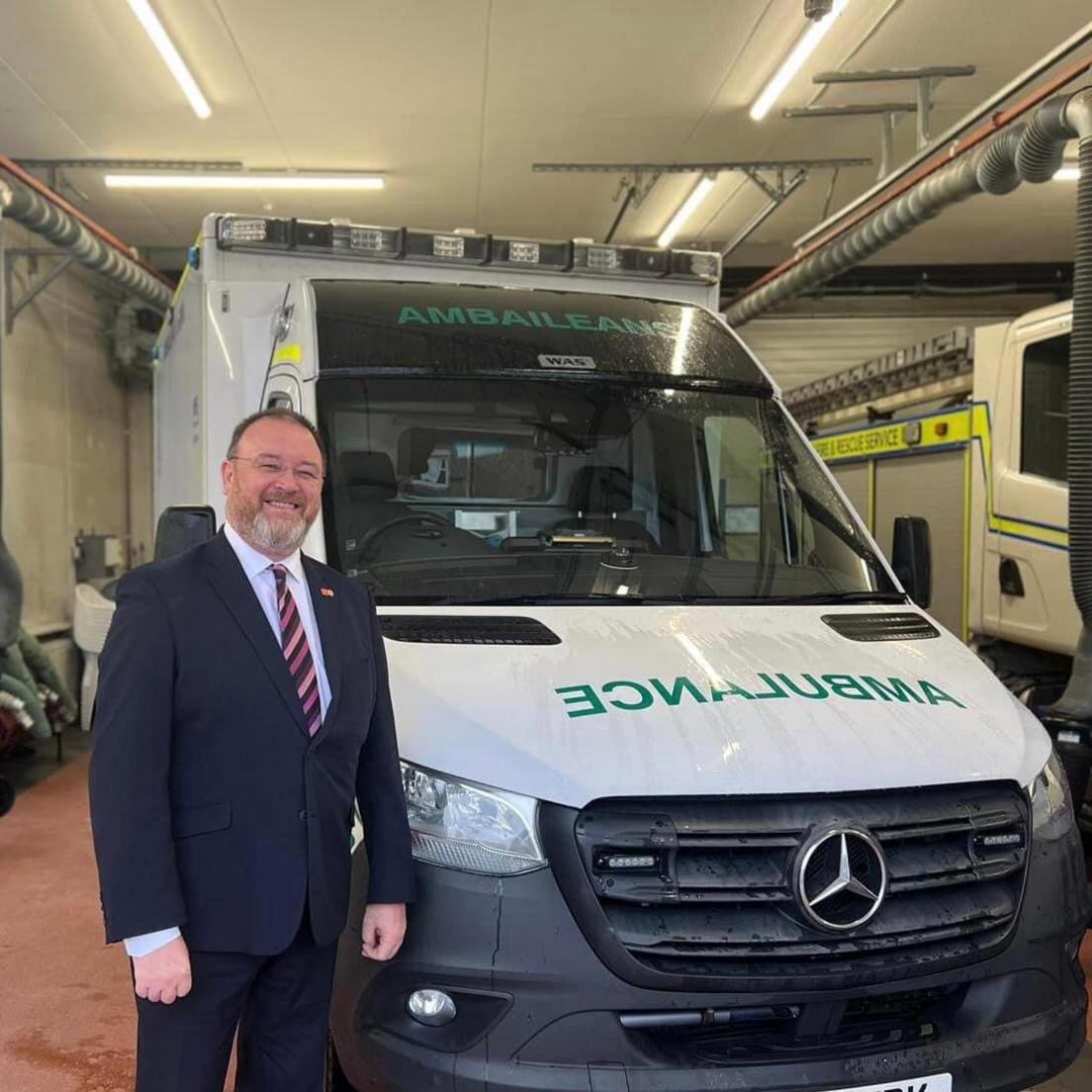Dropped Tory MP: I would have won my seat from hospital
David Duguid was deselected as a candidate for the Scottish Conservatives in Moray
- Published
David Duguid campaigned for a new ambulance in his constituency when he was an MP.
A few months later, earlier this year, he was a patient in it. Being raced to hospital after suffering a spinal stroke that left him unable to walk.
During his treatment things got more serious when he acquired pneumonia. The former MP says he “flatlined” twice due to nerve problems.
His injury sparked a series of events that would see him dropped as a general election candidate on health grounds.
Aside from the occasional social media post, Mr Duguid has kept quite a low profile throughout all the political drama.
But he’s now very keen to correct some misconceptions – such as a rumour he was in an induced coma – and believes the extent of his health problems have been exaggerated at points.
That’s not to say he didn’t face a very grave situation.
Tory candidate replaced by Douglas Ross says he is 'fit to stand'
- Published7 June 2024
Tories insist Ross played no part in dropping candidate
- Published8 June 2024
The former Scotland Office minister says he doesn’t remember much of April due to his condition, but as he came off drugs his senses returned and he realised “the nurses weren’t aliens trying to abduct me”.
As his health improved, his attention turned back to the day job.
After he was moved to a specialist spinal unit in Glasgow in May, Mr Duguid began to plan for his re-election in the general election that Rishi Sunak had just announced.
He acknowledges that he was never going to run a traditional campaign of knocking on doors and chatting to voters. At this point he was undergoing intense rehabilitation and learning to walk again.
But he was confident that a combination of hard work from his loyal team and social media campaigning from hospital would see him elected once again to represent Aberdeenshire North and Moray East.
But after a visit from a Scottish Conservative official, the decision was made to drop him as a candidate on health grounds.
Mr Duguid explains that the party was concerned about the duty of care it had to him, and didn’t want him to face the stress of a campaign.
But he says this decision just brought about a different type of stress by “basically putting me out of work”.

Mr Ross replaced Mr Duguid as a candidate
And there was another twist to come in this story.
The Scottish Conservative party leader, Douglas Ross, made the controversial decision to U-turn on a promise not to go back to Westminster, and decided to replace Mr Duguid as a candidate.
Mr Ross sent his Conservative colleague a text before his announcement asking for a chat, but Mr Duguid didn’t get back to him in time before the announcement had been made. So he found out when it was reported.
Some in the party were astonished by this decision. But Mr Duguid doesn’t share any outrage: “Somebody had to come forward, I guess it might as well have been Douglas”.
However, he does think that Mr Ross becoming the candidate made the SNP (who ultimately won the seat) throw everything at it in order to beat the Scottish Tory leader.
Not only did the Scottish Conservative leader lose the seat to the SNP, he announced plans to resign as party leader during the election campaign, acknowledging unhappiness at his decision to try and return to the Commons.
Mr Duguid’s biggest frustration is that he believes he would have won the seat had the party stuck with him.
He remains frustrated that local members didn’t get a say, and maintains that the party made the wrong decision.
He insists that a combination of his incumbency - and even a “sympathy vote” for his injury - would have seen him returned to Westminster.

Mr Duguid with the ambulance he campaigned for
Mr Duguid is clear that he doesn’t think the party was right to drop him. And he says there hasn’t been any contact from party officials since his candidacy was blocked (although individual politicians have been to visit him).
With all that in mind, it is surprising how philosophical he is about the whole saga. He chooses not to criticise the party too harshly.
Towards the end of our hour-long interview I point out that other people in his situation might have felt much more aggrieved.
He explains that in his previous business career he went on a sales training course that taught him never to get “bitter and twisted” about things you can’t control, and to focus on the positives.
His health scare has given him a new lease of life, and now he’s “just glad to be getting better”.
He’s grateful for the support of his wife and the NHS staff who have been aiding his recovery – and stresses that rehabilitation remains his key focus.
A return to the world of politics or business could be on the cards at some point, but the former MP is even willing to float the idea of a more unusual career change.
He says that watching the ongoing Paralympics from his own wheelchair has been inspiring, and though he’s past the stage of being an athlete, he might take up archery.
I ask if we’ll see him at the Paralympics one day. He replies: “I’m not going to count anything out.”